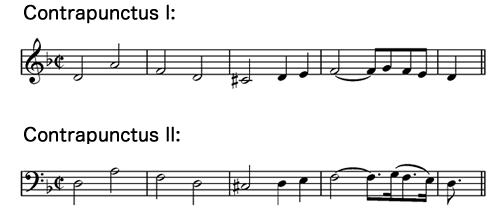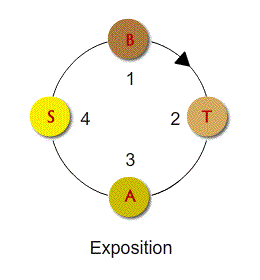Contrapunctus II from the Art of the Fugue
José Rodríguez Alvira
Structure of the Fugue
This illustration shows the structure of Contrapunctus II from the Art of the Fuge. Click any section for more information
Exposition
Contrapunctus II's subject is similar to that of Contrapunctus I. The only difference is in the rhythm of the last four notes:

The exposition starts with the bass, followed by tenor, alto and soprano. The rhythmic variation motive from the subject will be used throughout the fugue as counterpoint to the subjects. Here is the exposition:
Chris Breemer, piano. Courtesy of Piano Society.
Episode measures 17 to 22
A six measures episode based on the rhythmic variation motive from the subject follows the exposition:
Chris Breemer, piano. Courtesy of Piano Society.
Second Exposition
A second exposition starts in measure 23 in the order of alto, soprano, bass and tenor:
- The alto starts with a variation. The rhythmic variation motive from the subject is used instead of the first note of the subject. It starts in D minor but ends in A minor.
- The second voice (soprano) enters in stretto with the alto. The last note is a C instead of the expected A.
- One measure prepares the entrance of the third voice (the bass) in D minor.
- A 3 measure episode leads to the tenor entrance. It begins in D minor but ends in A minor.
Chris Breemer, piano. Courtesy of Piano Society.
Although the exposition begins with the bass while the second exposition begins with the alto, the entrance of the voices in both follow the order illustrated in this circle:

Measures 42 to 58
After a 3 measures episode the soprano presents the subject followed by the alto and bass:
- The soprano starts in F major but ends with an F sharp that leads us to G minor.
- The alto answer in G minor.
- The bass creates a 2 beat stretto with the alto (the first note is 4 beats long instead of 2) and moves to the key of Bb major.
Chris Breemer, piano. Courtesy of Piano Society.
Measures 57 to 65
A 4 measures episode takes us back to D minor. The bass presents the subject:
Chris Breemer, piano. Courtesy of Piano Society.
Measures 65 to 73
After another episode a syncopated answer appears in the tenor. The tenor starts in D minor and ends in A minor:
Chris Breemer, piano. Courtesy of Piano Society.
Measure 73 to the End
A final episode leads us to the last subject presented by the soprano in D minor.
The subject has appeared a total of 14 times in the fugue as follows:
| 1 | 2 | 3 | 4 | 5 | 6 | 7 | 8 | 9 | 10 | 11 | 12 | 13 | 14 |
|---|---|---|---|---|---|---|---|---|---|---|---|---|---|
| S | S | S | S | ||||||||||
| A | A | A | |||||||||||
| T | T | T | |||||||||||
| B | B | B | B |
Chris Breemer, piano. Courtesy of Piano Society.